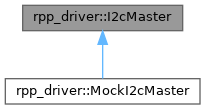I2C Master controller class. More...
#include <i2cmaster.hpp>

Public Member Functions | |
| I2cMaster (SdkWrapper &sdk, i2c_inst_t &i2c, uint clock_freq, uint scl_pin, uint sda_pin) | |
| Initialize the given I2C port and setup the pins. | |
| virtual | ~I2cMaster () |
| deinit the I2C by SdkWrapper::i2c_deinit(); | |
| virtual int | ReadBlocking (uint8_t addr, uint8_t *dst, size_t len, bool nostop) |
| Attempt to read specified number of bytes from address, blocking. | |
| virtual int | WriteBlocking (uint8_t addr, const uint8_t *src, size_t len, bool nostop) |
| Attempt to write specified number of bytes to address, blocking. | |
| virtual bool | IsDeviceExisting (uint8_t addr) |
| Check wether device at specified I2C address exists or not. | |
Detailed Description
I2C Master controller class.
This class provides a set of easy to use member function to control the I2C master controller. Everything operation in this class is polling based and blocking.
The constructor and destructor initializes and finalize the given I2C controller, respectively.
The ReadBlocking() and WriteBlocking() functions has nostop parameter. To use the restart condition, set this parameter to true.
Usage of mock
In the case of the testing of the user program which uses this class, a programmer can use the pre-defined mock class rpp_driver::MockI2cMaster. inside i2cmaster.hpp.
Constructor & Destructor Documentation
◆ I2cMaster()
| rpp_driver::I2cMaster::I2cMaster | ( | SdkWrapper & | sdk, |
| i2c_inst_t & | i2c, | ||
| uint | clock_freq, | ||
| uint | scl_pin, | ||
| uint | sda_pin | ||
| ) |
Initialize the given I2C port and setup the pins.
- Parameters
-
sdk Object of the SdkWrapper class. i2c i2c_inst_t type &. *I2C0 or *I2C1 clock_freq Usually 100,000 or 400,000[Hz]. scl_pin GPIO pin # sda_pin GPIO pin #
Receive the uninitialized I2C hardware by parameter i2c, and initialize it by SdkWrapper::i2c_init(). And then, set given pins to I2C function, and pull them up.
Member Function Documentation
◆ IsDeviceExisting()
|
virtual |
Check wether device at specified I2C address exists or not.
- Parameters
-
addr 7-bit address of device to read from
- Returns
- true if exist, false if not exist.
◆ ReadBlocking()
|
virtual |
Attempt to read specified number of bytes from address, blocking.
- Parameters
-
addr 7-bit address of device to read from dst Pointer to buffer to receive data len Length of data in bytes to receive nostop If true, master retains control of the bus at the end of the transfer (no Stop is issued), and the next transfer will begin with a Restart rather than a Start.
- Returns
- Number of bytes read, or PICO_ERROR_GENERIC if address not acknowledged or no device present.
◆ WriteBlocking()
|
virtual |
Attempt to write specified number of bytes to address, blocking.
- Parameters
-
addr 7-bit address of device to write to src Pointer to data to send len Length of data in bytes to send nostop If true, master retains control of the bus at the end of the transfer (no Stop is issued), and the next transfer will begin with a Restart rather than a Start.
- Returns
- Number of bytes written, or PICO_ERROR_GENERIC if address not acknowledged, no device present.
The documentation for this class was generated from the following file:
- src/i2c/i2cmaster.hpp